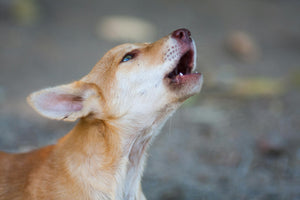2 min read • By Wyatt West, Staff Writer & Outdoor Fiend, Timberdog
Ever wondered why your dog turns into a canine crooner the moment you step out the door? It’s a common scene: you grab your keys, head for the door, and suddenly, your dog starts an operatic performance that rivals the best tenors. Let’s delve into the reasons behind this behavior and strategize the right type of environment to calm down your pooch.
1. Separation Anxiety
One of the most common reasons dogs bark and howl when left alone is separation anxiety. Dogs are pack animals, and they form strong bonds with their human families. When you leave, they feel anxious and stressed, expressing their distress through vocalizations. It’s their way of calling out, “Where are you going? Please come back!”
2. Attention Seeking
Dogs are smart. They quickly learn that barking and howling can grab your attention. If they’ve seen you rush back to comfort them in the past, they might continue this behavior to keep you from leaving or to get some extra love and attention.
3. Boredom and Loneliness
Imagine being left alone with nothing to do. It sounds pretty dull, right? Dogs can feel the same way. Barking and howling might be their way of entertaining themselves or breaking the silence. It’s their version of singing in the shower or talking to themselves.
4. Territorial Behavior
Dogs are naturally protective of their home. When you leave, they might feel the need to take on the role of chief guardian. Barking and howling can be a response to any perceived threats or unfamiliar noises they hear, signaling to potential intruders that their territory is well-guarded.
5. Breed Tendencies
Some breeds are more vocal than others. For instance, Huskies and Beagles are known for their howling. If your dog belongs to a vocal breed, their howling when you leave might just be a part of their genetic makeup.
What Can You Do?
Understanding why your dog barks and howls is the first step in addressing the behavior. Here are a few tips to help soothe your anxious pup:
-
Exercise Before Leaving: A tired dog is a happy dog. Make sure they get plenty of physical and mental stimulation before you head out. On mornings when I don't have time for a long walk, I toss the ball around for 20-30 minutes at a nearby park, and that usually gets Angus good and tired.
-
Gradual Training: Practice short departures and gradually increase the time you’re away. This helps your dog get used to being alone without feeling abandoned.
-
Use Technology: Consider using a pet camera to monitor your dog and even talk to them while you’re out. I have a 3-camera setup that protects both my home and my dog. It's great because I put on the tracking setting to follow my dog around (especially helpful for dog parents who are afraid their pup may get into some mischief when left to their own devices). I use the intercom feature intermittently throughout the day to speak to Angus while I'm at work.
- Create a Comfortable Space: Ensure your dog has a safe, cozy spot to relax while you’re away. A favorite blanket or toy can provide comfort. I like to leave Angus with an old, unwashed sweatshirt of mine, as it has my smell on it.
Remember, it’s natural for dogs to miss their favorite humans. With a little patience and training, you can help them feel more comfortable and secure when you’re away and make those goodbyes a little easier on both of you.
Photo Credit: Žaneta Mišutová

